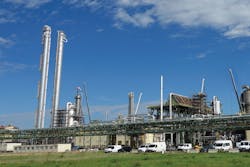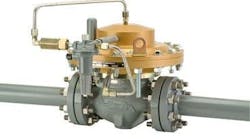In regular intervals, every process plant needs to be shut down to carry out inspections, maintenance, repairs and safety inspections. This is called “turnaround” or “major shutdown.” The term shutdown, however, does not adequately describe this large-scale project.
The term turnaround is much better since this is what is done: Every single part of the plant is “turned around” once and is disassembled, maintained and assembled again. The naphtha cracker, the heart of the Dow-Olefinverbund chemical plants in Germany, is – just like compressors, pumps and turbines – shutdown during the turnaround of the Böhlen plant. However, a lot more people work in the plant during the turnaround than during normal operation.
According to regulations, the turnaround takes place every three to five years. The personnel required and the logistical efforts are huge. In addition to the approximately 900 Dow employees and external service partners, approximately 1,200 other specialists from different companies came to Böhlen for the company’s last turnaround. They disassembled the plant step by step, inspected each component thoroughly, cleaned each and replaced any if needed. Sensors, measuring devices or pipelines belong, for example, to the discarded components if they were replaced. Heavy-duty cranes, rising into the sky by the dozens among the plants and scaffolding, lifted and positioned the heavy components. To coordinate all these tasks, Dow created a new, large car park with its own traffic light system as well as a container village.
The plant’s core
Via a 430-kilometer long pipeline, petroleum is brought from the harbor in Rostock to Böhlen where it is further processed. The chemical plant close to Leipzig is part of Dow Olefinverbund GmbH, a subsidiary of the U.S.-based Dow Chemical Company. At around 800°C, the petroleum is cracked into hydrocarbon compounds, such as ethylene and propylene, within the naphtha cracker’s 15 furnaces. This is the basis for producing high-quality plastics in the Dow plants in Schkopau and Leuna. While the naphtha cracker is the heart of the Olefinverbund, it also assumes further tasks, such as providing process steam for other parts of the chemical plant.
Time is money
When the naptha cracker is not functioning, high costs are incurred. During regular operation, the plant generates a daily turnover in the amount of 1 million euros. The target is, therefore, to keep the shutdown as short as possible. This requires meticulous planning for around 30 months to complete the turnaround in the tight timeframe of six weeks.
Shutdown in 10 days
The plant cannot be suddenly shut down. “In order to shut down the ongoing processes in a coordinated way, I’m working with a team around the clock in three shifts for nearly 10 days,” says Jörg Friedrich, who was responsible for the operation of the naphtha cracker at Dow. Many of the plants that depend on the Olefinverbund’s heart also are maintained and shutdown, but not all of them. This constitutes a special challenge, particularly regarding safety.
Safety experts
The operational safety of the complete plant must be assured for the upcoming years and after the restart. Decisive for the inspections is the Industrial Safety Regulation including explosion protection, which is now regulated in the Ordinance on Hazardous Substances. TÜV SÜD Chemie Service GmbH has been involved in Dow’s safety inspections for many years. The experts are knowledgeable. One example is Peter Goth, who has worked in the plant for nearly 35 years and who knows the cracker well. Two other colleagues also permanently work in the plant. They combine experience in the management, organization and logistics of large-scale projects and the specific knowledge of the plants on site. Employees from other chemical sites, such as Frankfurt-Höchst and Leverkusen, came to Böhlen for the safety installations. In total, 13 experienced specialists worked on site to carry out the many statutorily prescribed inspections.
Long-term practical experience counts
The safety company inspects numerous components and systems – such as the tightness of the pressure vessels. Corrosion monitoring is an important part of the safety inspections. Therefore, 100 vessel nozzles had to be replaced.
What is important in the chemical industry is long-term practical and professional experience. Goth uses the example of a welding seam to explain why experience is important. He says, “It might look a bit sloppy, but the seam is high-quality craftsmanship and still intact after dozens of years of operation.” An observer, who only knows the flawless welding seams produced by modern, fully automatic machines, would surely assess the situation differently.
Costs that pay off
“In total, we [invested] around 42 million euros in this turnaround. In addition to the shutdown costs of around 50 million euros resulting from turnover losses. A high investment, but necessary for safe operation,” says Dow shutdown manager, Reiko Hass.
The turnaround for Dow is about more than a statutorily prescribed safety inspection. The innovation cycles in this high-tech area become shorter and shorter. At the same time, the requirements for functional safety increase. This is why the time during which the plant is out of operation is also used for the renewal of plant parts.
Shortly after the restart of the plant, those responsible start planning the next turnaround.
Dipl.-Ing. Olaf Fuchs studied thermal process engineering at the technical university Otto von Guericke, Magdeburg. After his studies, he worked for 13 years in apparatus and tank engineering and was a production manager for 10 years. Afterward, he worked many years for a technical inspection organization. Since 2007, he has worked at TÜV SÜD GmbH as an expert witness in the area of plant safety and inspection. Since 2010 he has been head of plant monitoring in central Germany. He may be reached at [email protected] or +49 3461 49-2263.
5 Tips for a Successful Turnaround
1. Occupational and operational safety are top priorities. Only when these goals are clearly communicated by the company’s management and implemented throughout the whole company is planning complex turnaround processes topdown and realizing them successfully possible.
2. Long-term practical experience is what counts — for everyone involved. Complex plants are often unique in terms of their specific configurations. Therefore, employees, suppliers and service providers who know the plants, their components and their particularities in detail are of considerable value.
3. Create a team with strong communication skills that assumes responsibility. When unforeseen events or clashing interests (for example, budgeting versus repair measures) occur, all involved parties coming to a practical agreement is important.
4. Consider both the target and actual situation during the planning of the many work sequences and the organization of the equipment, tools and spare parts, professional software systems, and databases that provide valuable assistance.
5. Encourage the employees’ motivation, but at the same time, do not put them under too much pressure. Stress means mistakes, and resulting corrections may contribute to much higher costs than a conscientious and calm process.


